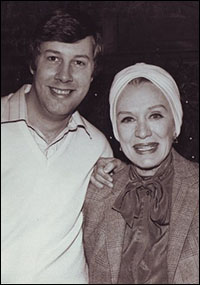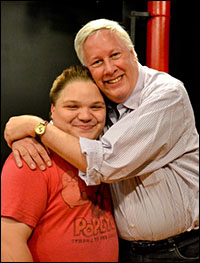
*
Theatre fans have a macabre fascination with flops. The more celebrated the turkey, the harder it is for the stage aficionado to let it go. Last season, Off-Broadway's MCC Theater received a considerable amount of national publicity — and an infusion of new theatregoers — for reviving the notorious musical bomb Carrie, employing a revised script and score. Perhaps the artistic director of the tiny Beautiful Soup Theater Collective in New York City took note, for this winter it will revive Carrie's only modern rival in the annals of Broadway flopdom: Moose Murders.
Moose Murders, a would-be murder mystery/farce hybrid by Arthur Bicknell, closed on its opening night, Feb. 22, 1983, at the Eugene O'Neill Theatre, and has lived on since as one of the most spectacular man-made disasters ever, primarily due to an infamous, and oft-quoted review penned by then New York Times drama critic Frank Rich. "From now on, there will always be two groups of theatregoers in this world: those who have seen Moose Murders, and those who have not," ran his lead.
Only Rich and the few others who attended the show can really attest as to how bad it was. But that has not prevented others from embroidering a bit on its ranking as a catastrophe. In 2000, AARP magazine listed it among the biggest flops of the 20th century, along with the Edsel and New Coke.
"This play won't die," said Bicknell, who lives in Ithaca, NY, and whose stage career never recovered from the disaster. "It will not die. I thought, well, this is not the only bad play that's ever been on Broadway. I thought it would be forgotten. Just it just keeps going and going." Bicknell has made peace with his status as the author of a monumental bomb. Indeed, he seems to relish it. Not only did he make revisions to the Moose Murders script for the upcoming revival, but he has written a memoir of his experience shepherding the original production to its Broadway doom. It's titled "Moose Murdered: How I Learned To Stop Worrying and Love My Broadway Bomb," and is self-published. The book's release is timed to coincide with the Beautiful Soup production at the Connelly Theatre in the East Village. Strike while the iron is hot, seems to be Bicknell's motto. "We can't expect there will be a lot more revivals," he reasoned. "So now's the time!"
The writer hadn't read Moose Murders for some years when he became aware of the interest of the Off-Off-Broadway, non-Equity Beautiful Soup company. (Read about the coming production, directed by Beautiful Soup founding artistic director Steven Carl McCasland.) "Knowing there was going to be a revival of a play of mine that was a big flop on Broadway 30 years ago, I thought, 'Well, I better take a look at this again. Is there anything I can do about it?'" said Bicknell. "I mean, this is bigger than I am. Moose Murders is a legendary flop. It's the standard by which all Broadway turkeys are measured. There's very little I can do about that. But maybe something I could do is take a look at the Samuel French script."
He said he was appalled by the number of structural mistakes in the text. "I thought the least I could do was address these gaping holes in the plot and maybe create some guidelines. I mean, it's a murder mystery for God's sake."
| |
 |
|
| Arthur Bicknell and Eve Arden |
Of course, all bad productions begin with good intentions. Bicknell said that, at the time, he was fascinated with stage conventions, and was attempting to lampoon them by writing a murder mystery that was also a farce. "It's a very hard thing to do," he said, dryly, "as we discovered."
Did he think he had succeeded in writing a good play? "No," he replied. "I don't think so. But I thought it was a funny play. Everyone I showed it to thought it was a funny play." That included John Roach, the novice producer-director who decided to bring the play to Broadway, and Eve Arden, the former film and television comedienne who signed on to star. "She thought it was very funny, too. She was going to return to Broadway after 40 years."
Bicknell himself, while not famous at the time, was not exactly a nobody. "I was thought of as a promising young playwright in the vein of Albert Innaurato. I had one play that was called My Great Dead Sister: World of Domesticity, which was directed by Norman Rene. That play was a comedy-drama. It got very good reviews from the same people who trashed me in Moose Murders. I was writing serious light comedy." (Beautiful Soup also did a reading of Dead Sister, on Sept. 9.)
| |
 |
|
| Beautiful Soup artistic director Steven McCasland with Bicknell. | ||
| Photo by Samantha Mercado-Tudda |
It was decided to do the play on Broadway, without an out-of-town tryout. "There was a lot of discussion of maybe doing it Off-Broadway, and I remember I was trying to get Anne Meara to play a role in the show, and she said, "You're going to do this on Broadway?'"
Finally, Arden dropped out after one performance. Bicknell said, "I think she read it very well. But afterwards she said, 'This just isn't right for me.'" The reason given was "artistic differences." Holland Taylor replaced Arden for the second preview. "There was a lot of confusion" in the production, said Bicknell, "a lot of incompetence."
All of this, and more, is covered in Bicknell's memoir. "It's one of those stories where you say, 'Well, it can't get any worse.' Then you turn the page and it does!" Bicknell had been encouraged by various people over the years to record his account of the debacle, but never did. The thing that changed his mind sounds like the kind of improbable plot detail that might have be pulled from Moose Murders itself.
"I kept journals throughout the experience" of producing the play, he said, "but I lost them along the way. That was my reason I gave for not doing writing a memoir. I said, I can't just try to do this from memory. Then one day, a few years ago, I received a package that had no return address and inside were all those journals. To this day, I don't know how they came back to me. But I couldn't ignore an obvious omen." So he wrote the book. Bicknell say he has bears no animosity toward Frank Rich. "I wish I had met Frank Rich," he said. "I think he's great. A lot of people called it a scathing review. I didn't think it was scathing. I think it's one of the best reviews he ever wrote. He was actually very fond of Moose Murders. It fascinated him. It was a hallmark for how bad things can get. I think he wrote that of all the Playbills he received while critic of the Times, the only one he kept was Moose Murders."
Over the post-Moose Murders years, Bicknell has taken on many odd jobs, including a reservations clerk for Air France. Lately, though, he has returned to his first love, forming, with Rachel Hockett, a small theatre company in Ithaca called the Homecoming Players.
"I decided to follow my dream. I'm a very old man. It's the city I grew up in, the most beautiful place on earth, and I'm doing, finally, the thing that I love, which is theatre."
*
For more information about the Jan. 29-Feb. 10, 2013, production of Moose Murders, visit beautifulsouptheatercollective.org.











